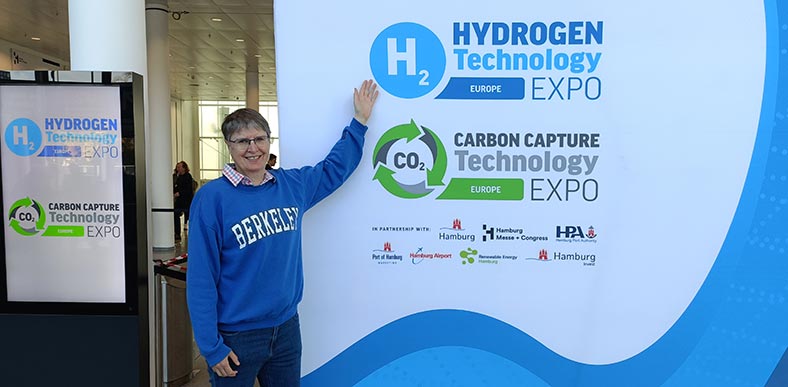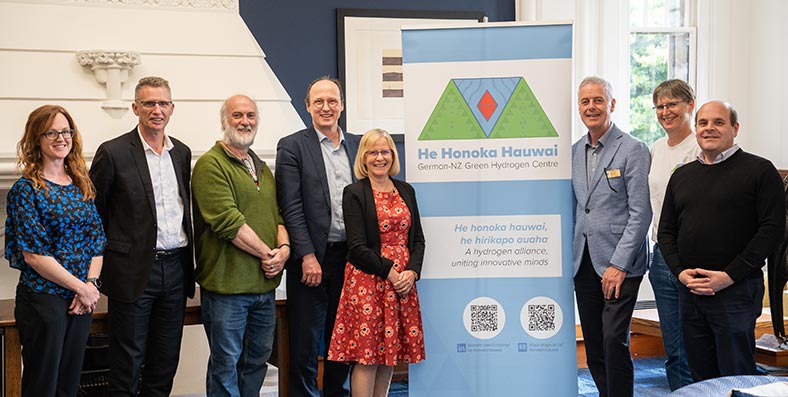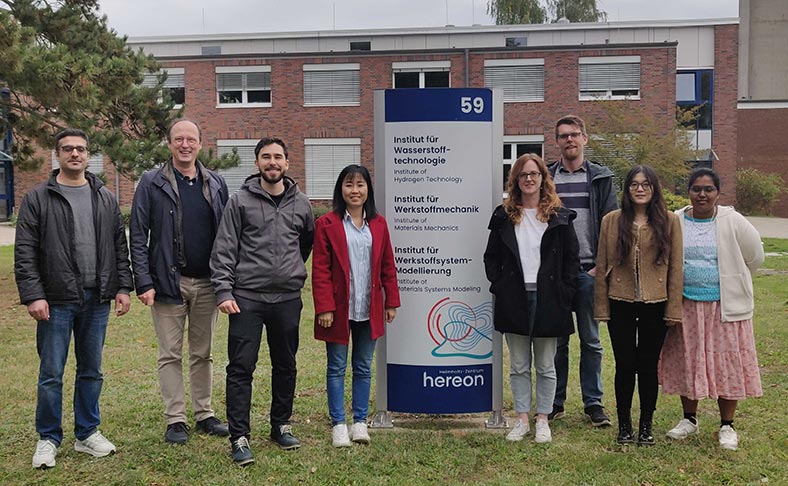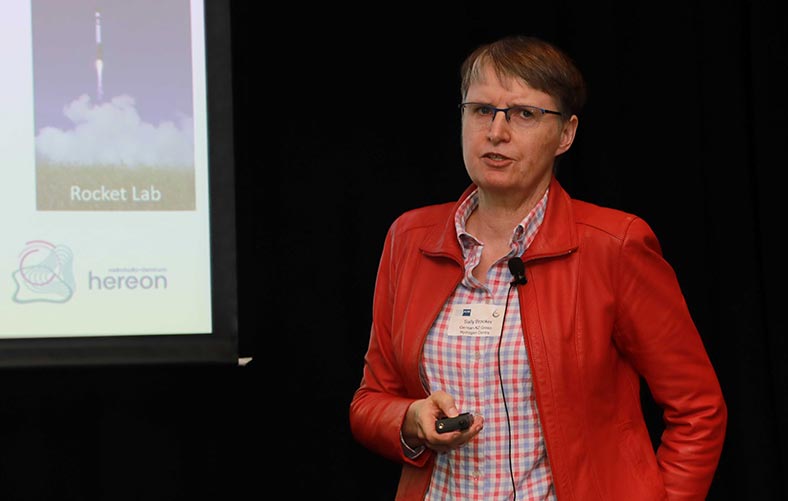Science is people - Annual Report 2024
8 June, 2025
2024 saw connections with our German colleagues continue to deepen in relation to green hydrogen research.
Our scientists have long enjoyed close research collaborations with German researchers, and these have focused in recent years towards the green hydrogen research space. Current collaborations were given a boost in 2021 with the announcement of the establishment of a German-New Zealand Green Hydrogen Centre (He Honoka Hauwai) (2021-2026) and then again in 2022 with the award of three German-New Zealand research grants (2022-2025), with all four jointly funded by Germany (BMBF) and New Zealand (MBIE Catalyst).
MacDiarmid Institute Investigators are leading, and extensively involved, in three of the four projects, including in the German-New Zealand Green Hydrogen Centre He Honoka Hauwai in partnership with Ngāi Tahu, who generously gifted the centre its name, logo and phrase.
Ta Tipene O'Regan ONZ, Upoko o Awarua Runaka, Patron of Murihiku Regeneration comments, "If we are not going to transit into green hydrogen, then please tell me what we are going to do! This country has no enduring or useful alternative for its future!"

Sally Brooker at the H2 Expo in Hamburg
Ōtākou Whakaihu Waka University of Otago (UoO) based Principal Investigator Professor Sally Brooker co-leads He Honoka Hauwai with Dr Paul Jerabek (Helmholtz-Zentrum Hereon), and Te Whare Wānanga o Waitaha University of Canterbury (UoC) based Principal Investigator Professor Aaron Marshall is the New Zealand deputy lead. The team is establishing the physical centre at UoO, growing our German-New Zealand research and industry connections, and engaging in schools and public outreach.
This is an example where strategically targeted government funding contributes greatly to deepening research connections between New Zealand and a key science research partner Germany.
Professor Sally Brooker MacDiarmid Institute Principal Investigator
"Germany is putting considerable resources into the green hydrogen space and keen to work with NZ researchers. These four co-funded projects enable us to partner with this key international strategic partner, building impactful research and industry links as well as working to deliver climate impact research that NZ and the rest of the world needs."
Paul Jerabek says, "Our ongoing collaboration represents much more than just scientific research - it's a bridge between two nations committed to solving global challenges. By combining New Zealand's unique plethora of renewable resources and Germany's technological expertise, we're not just developing innovative hydrogen technologies, we're actually creating a blueprint for other international scientific cooperations that could help transform our global energy future. NZ has an extraordinary advantage with its abundant almost untapped renewable energy potential, particularly from hydro, wind, and geothermal sources, which makes it an ideal environment for green hydrogen production and utilization. The passion and innovative spirit of NZ researchers, combined with their deep commitment to sustainable technologies as well as social and generational responsibility, makes this collaborative research not just productive, but truly inspiring."
Affordable green hydrogen production
Aaron Marshall (UoC) leads one of the three research projects funded in 2022. This grant aims to develop more efficient anodes for anion exchange membrane electrolysers to produce affordable green hydrogen. The collaboration is on "developing low-cost AEM water electrolysers" and involves from the German side, Fraunhofer IFAM Dresden researcher Dr Christian Immanuel Bernäcker and University of Bayreuth's Professor Christina Roth, and from the New Zealand side, MacDiarmid Institute Principal Investigator Professor Geoff Waterhouse (Waipapa Taumata Rau University of Auckland (UoA)), Associate Investigator Dr Kim McKelvey (Te Herenga Waka Victoria University of Wellington (VUW)), Professor Daniel Holland and Aaron (both UoC).
The team has developed new catalysts and porous electrode structures and has recently been awarded Australian Synchrotron beamtime to investigate these in order to understand how gas bubbles are evolved in these structures. The team is commissioning a demonstration water electrolyser when our German collaborators visit New Zealand for AMN11 and the third New Zealand Hydrogen Symposium (NZHS), both in February 2025. The grant also enabled Christina Roth (also a Keynote at AMN11) to teach at UoC for a semester in 2024.
Affordable green hydrogen storage
Another of the three research projects funded in 2022 relates to cost effective hydrogen storage materials using NZ resources and is co-led by Paul (Hereon) and Sally (UoO), and includes on the New Zealand side MacDiarmid Institute Investigators Professor Chris Bumby (VUW), Professor Nigel Lucas (UoO), Associate Professor Anna Garden (UoO), Professor Alex Yip (UoC) and Professor Peng Cao (UoA), along with Associate Professor Michael Jack, Associate Professor Jonathan Lever, MacDiarmid Institute Affiliate Dr Dave Warren, Dr Linda Wright and Terry Nicholas. The German team are drawn from the internationally renowned Institute of Hydrogen Technology at Helmholtz-Zentrum Hereon (Hereon) and includes Dr Claudio Pistidda, Professor Thomas Klassen, Dr Klaus Taube and Professor Julian Jepsen.

From left: Anna Garden, Richard Barker (PVC Sciences), Dave Warren, Thomas Klassen (Director, Institute for Hydrogen Technology, Helmholtz Zentrum Hereon), Helen Nicholson (Acting VC), Richard Blaikie (DVC R&E), Sally Brooker and Nigel Lucas.
This team aims to develop a more cost effective, so more commercially viable, hydrogen storage technology using NZ resources. Specifically, the team will develop safe, large-scale, long-term hydrogen storage materials using TiFe (titanium iron) metal alloys, researching how to make these materials from New Zealand resources - including from the ilmenite sands on the West Coast near Barrytown.
Anna Garden says this is a different approach to producing FeTi (ferro titanium). "FeTi (the material we are interested in) is usually produced from pure Fe and pure Ti, whereas here we are trying to make it directly from the ilmenite sands. Nigel, Claudio and Chris are working on different methods to do this and to test the subsequent hydrogen uptake, and Paul and I are working on modelling the material, including the possible effects of impurities. If impurities are not going to be a problem, or indeed if they help, then we can avoid the economically and environmentally costly purification processes."
Anna says there are extensive in-person collaborations underway for the storage project, many at the PhD student level, with their German partners at Hereon, which is based just outside Hamburg.

Some of the He Honoka Hauwai German-NZ Green Hydrogen Centre team visiting materials design collaborators at the Institute for Hydrogen Technology at Helmholtz-Zentrum Hereon. From left: Mohammad Zarar Rasheed, Thomas Klassen, Ebert Alvares, Thi-Thu LE, Anna Garden, Alex Haack, Yuanyuan Shang and Lathapriya Vellingiri.
"PhD student Alex Haack (who is supervised by Nigel Lucas) spent his first year in Germany and is now in New Zealand at UoO. My PhD student Lekshmi Dinachandran started with me here at UoO and has spent two months in Hereon with Paul this year, with another trip in the planning. Chris Bumby's PhD student Zarar Rasheed also spent a couple of months at Hereon this year."
She says those are just the directly MacDiarmid Institute-related ones. "Beyond that, as part of the project, Michael Jack's PhD student (Al-Hasan Abdulwahid) visited Hereon recently and is looking to return in 2025."
Anna says her UoO team have also had several visits from the German postdocs, as well as from Paul, Klaus and Thomas (head of the hydrogen institute at Hereon), along with a visit from representatives from the German Parliament (all parties except one), in a 'Pacific Friendship Meeting', which was also attended by their local Member of Parliament, Hon Rachel Brooking. Klaus presented a keynote at NZHS-1, Thomas at NZHS-2, and Claudio (head of the materials design department at Hereon) will at NZHS-3. Paul has also participated in all NZHSs and several AMN conferences, and will talk at AMN11 in February 2025.
Our namesake Alan MacDiarmid said ‘Science is People’ and this is very much the case with these projects: relationships are being built between people, over time and research together.
Professor Sally Brooker MacDiarmid Institute Principal Investigator

Sally Brooker speaking at H2Wheels, Te Papa
Sally says the success of the project centres on the strong relationships being developed between researchers. "Our namesake Alan MacDiarmid said 'Science is People' and this is the very much the case with these projects: relationships are being built between people, over time and research together, which is bigger than just what they do, as it's also getting to know who they are working with, which in turn leads to long term collaborations. So a cornerstone of the success of these projects is the movement of people between the two countries.
"Alan MacDiarmid would be proud."


